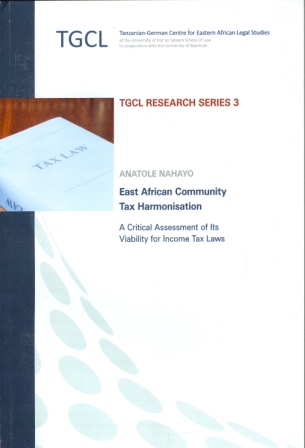
East African Community Tax Harmonisation
A Critical Assessment of Its Viability for Income Tax Laws
Author: Anatole Nahayo. Series edited by: Tanzanian-German Centre for Eastern African Legal Studies.
Series: Tanzanian-German Centre for Eastern African Legal Studies, TGCL Research Series Volume 3
201420 pp. Roman, 342 pp.
Text language(s): English
Format: 170 x 245 mm
540 g
Paperback
€ 39.80
Buy 'East African Community Tax Harmonisation' as a downloadable PDF document directly from our online shop »
Order 'East African Community Tax Harmonisation' as print edition »
This work critically scrutinises the income tax laws of the partner states of the East African Community, with a view to assessing their convergence, their divergence, their compatibility with the principles formulated to achieve the goal of integration, and above all their amenability to the harmonisation effort. The objective, on the one hand, is to critically assess whether tax integration is a viable option, and, on the other hand, to explore whether it is feasible to stretch the effort even further and establish a single unified income tax system within the Community.
The research findings warn of the real danger posed by the continuing wide disparities in economic levels, economic endowments and other factors, which still lead the partner states to focus more on municipal objectives than the professed objective of integration. The study does not show this last objective to be impossible of attainment; rather, it identifies the obstacles which need to be surmounted if success is to be achieved.
It recommends a re-examination of current approaches in order to avoid the challenges that have persistently dogged multilateral arrangements on taxation. It argues that the Community cannot bring about a multilateral tax regime through bilateral mechanisms. The premonition from the very beginning of the research was that to talk of harmonisation of income tax systems within the Community, instead of unification of the systems, spelt doom. In this context, therefore, this study is not only cautionary, but also rescue-based.
Accompanying material:
| « back | Print version | [top] |
 Books
Books Audio
Audio Biographies
Biographies Series
Series Festschrifts
Festschrifts Journals
Journals